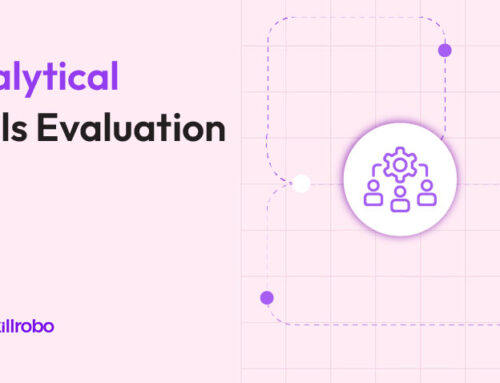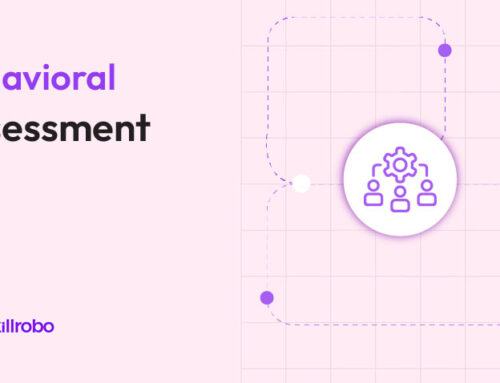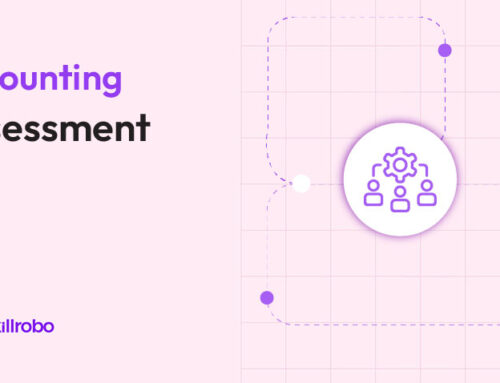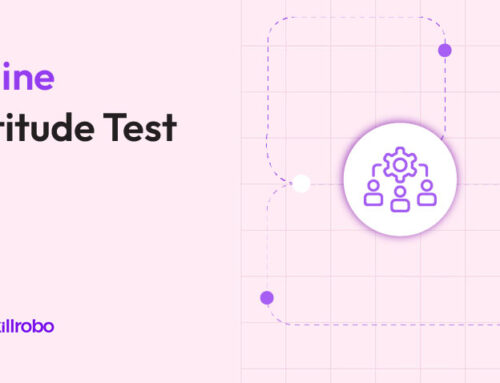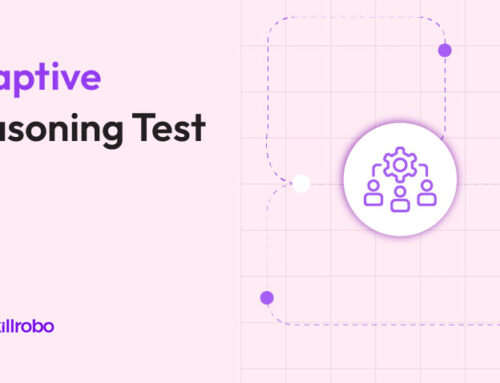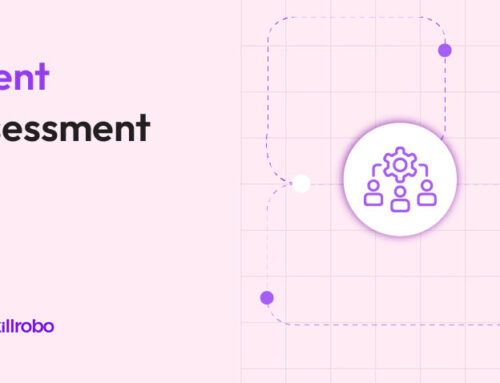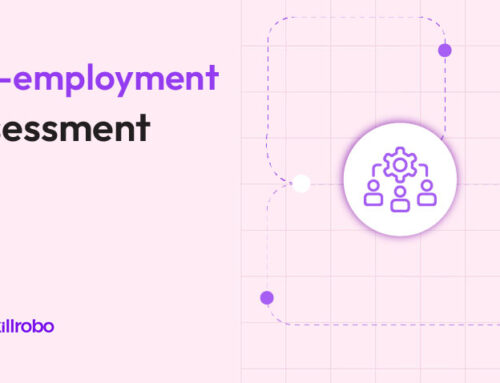Table of Contents
Related articles

The majority of hiring managers find themselves in a situation where they lack the rigorous evaluation techniques and practical insights needed to perform effective candidate screening. Finding the most sought-after employees without a data-driven screening procedure is akin to looking for a gem in the sea. Additionally, employers have used resumes and interviews for a very long time to learn as much as they can about applicants.
Despite this, the majority of resumes are so liberally peppered with lies that they seem unreal. Similarly, unstructured and unconventional interviews do not offer pertinent information about a candidate’s likelihood of succeeding in their position. Because of this, assessment tests that are intended to dive deeper into a candidate’s aptitude, personality, and skill set perform better as a recruitment tool. Online assessments are the most convenient way to recruit the best candidates with complete performance insights.
Online assessments have become a popular tool for employers, recruiters, and educators to evaluate the skills, knowledge, and abilities of candidates or learners. As technology advances, the use of online assessments has become increasingly important in today’s world. In this ultimate guide, we will help you master the art of online assessments by providing you with essential information on the benefits of online assessments, types, advantages of using online assessment tools, steps to create effective online assessment tests, and more.
What is an Online Assessment?
An online assessment is an evaluation conducted via the Internet, using various tools and techniques to measure a person’s knowledge, skills, abilities, or personality traits. Online assessments, quizzes, questionnaires, simulations, and games are just a few of the different formats that can evaluate the candidate’s capabilities and personality traits. They can be used for a variety of things, such as psychological, job, and educational tests.
Online tests are frequently given remotely, enabling participants to complete them from any location with an internet connection. This makes it easy for those who live in different geographical locations to access the tests. The results of online tests are frequently generated automatically and may be used to guide choices in school, career, or other pursuits.
Online assessments are used in various fields, including education, employment, and psychology. In education, they can be used to evaluate student performance, provide feedback to teachers, and inform instructional decisions. In employment, they are used to screen job candidates, evaluate employee performance, and provide training and development opportunities.
Types of Online Assessments
Online tests are dualistic; they can be utilized for both qualitative and quantitative purposes. Such a test would quantify a person’s technical proficiency by measuring how quickly they can execute a coding task. Similar to this, a reaction-based assessment exam designed to evaluate a subject’s soft skills will assist in revealing fresh facets of his or her personality.
There are several types of online assessments, each used for different objectives. Mainly, these assessments used in the recruitment process provide an opportunity to filter the best from a pool of candidates. These assessments allow you to evaluate candidates’ abilities in several talent areas. It can evaluate a variety of factors; for instance, in addition to assessing a candidate’s technical skills, it is simple to comprehend their cultural fit and psychology using online psychometric tests, behavioral tests, technical assessments, role-specific tests, etc.
Behavioral Assessments –
Employers may also use behavioral assessments in the form of personality tests or other psychometric assessments. These assessments aim to provide insight into a candidate’s personality traits, values, and work style, which can be useful in determining whether they are a good fit for the organization.
The goal of behavioral assessment is to make more informed hiring decisions based on objective criteria, rather than simply relying on subjective impressions or gut feelings. By using behavioral assessments, employers can better predict a candidate’s future performance and ensure that they are hiring the best possible candidate for the job.
Behavioral assessment typically includes a series of situational questions, designed to elicit information about how the candidate has handled specific work-related scenarios in the past. The questions are often focused on the candidate’s ability to solve problems, work in a team, manage conflict, and communicate effectively.
Psychometric Test –
Psychometric tests are tools for evaluating a person’s abilities, behavior, and skills. They are intended to evaluate character qualities and role compatibility. They track the impact of individual behavior on group dynamics at work and the other way around. Employers then utilize insights obtained from psychometric assessment exams to determine the best candidates for open positions. They are separated into two groups, which are cognitive tests and personality tests.
Cognitive tests –
Cognitive tests analyze a person’s cognitive abilities, including their capacity for critical thought, verbal reasoning, numerical aptitude, problem-solving, decision-making, etc. The test insights evaluate hiring candidates at all job levels and serve as a gauge of performance in the workplace. These online evaluation tools also examine IQs for various career roles that are particular to those roles.
An essential part of charting the development of the workforce is the use of cognitive testing. They highlight the areas where employees need to receive training to close competency gaps. Additionally, they assist HR in increasing the caliber of hires.
Personality tests –
The basis of personality tests is the idea that underlying qualities influence how an individual behaves in observable ways, which varies from person to person. It is a methodical assessment of psychological constructs in people. It frequently takes place during the pre-employment evaluation process. These tests are given by the employer to evaluate a candidate’s personality traits.
The Personality tests track the relationship between an applicant’s personality attributes and their success at work. The Big Five OCEAN (Openness, Consciousness, Extraversion, Agreeableness, Neuroticism) model identifies the five fundamental personality qualities among the numerous trait theories.
Technical Assessments –
Technical assessments concentrate on a person’s subject matter competence in their field of employment. They challenge an individual’s in-depth knowledge to the test. Technical assessments focus their questions on the specific role’s skill requirements. To hire the most qualified tech experts, employers use technical tests to evaluate applicants’ knowledge across skills and subskills.
Through the technical assessment test, the specific abilities and proficiency required for a given job role are quickly assessed. Recruiters can ascertain whether candidates have the necessary skills needed for a particular position by conducting a technical exam
Role-Specific Assessments –
Role-based tests, also known as domain skills tests, are appropriate for evaluating applicants’ job-specific skills. With the use of these assessments’ professional-curated challenges, recruiters can evaluate job seekers’ skills. Role-based evaluations serve to ascertain a person’s level of domain knowledge. As a result of the evaluation results, managers can customize training programs for workforce development that meet industry standards.
Communication skill assessments –
Communication skill assessment evaluates a person’s fluency, pronunciation, grammar, and comprehension abilities. It is essential for efficient communication. This pre-employment test serves as a screening tool that helps businesses locate individuals with strong oral and written abilities while filtering out undesirable prospects.
The communication test offers a precise evaluation of a person’s language proficiency in speaking, writing, and listening. These assessments offer essential data about a candidate’s and an existing employee’s proficiency in the language needed to understand and express thoughts, ideas, and problems.
Benefits of Online Assessments
There are numerous benefits of using online assessments. When it comes to giving an extensive review of candidates’ abilities, online tests are superior to their actual counterparts. The main advantage these evaluations have over their predecessors is the accuracy and adaptability they provide to recruiters in different talent verticals and the ability to quickly weed out outliers from the cohort.
There are several benefits of online assessment in hiring, some of which include –
Time and cost efficiency –
Online assessments can be administered remotely, which saves time and money on travel, venue rental, and other associated costs. Additionally, they can be completed quickly, allowing employers to streamline the recruitment process and make quicker hiring decisions.
Enhanced candidate experience –
These assessments provide candidates with a convenient and flexible way to showcase their skills and qualifications. They can complete the assessment at their own pace and from the comfort of their own home, reducing the stress associated with in-person assessments.
Data-driven insights –
They generate large amounts of data that can be analyzed to identify patterns and trends. This can help employers make informed hiring decisions based on objective criteria.
Flexibility –
Online exams provide unmatched convenience for taking tests from any location. Examinees can take an exam safely and conveniently from the comfort of their homes thanks to features like online remote proctoring.
Scalability –
The simplicity of overcoming geographic restrictions was made possible by the development of online assessment tests. In contrast to the past, when administering exams was restricted to physical testing centers, examining bodies can now reach out to candidates from remote locations.
Reduced Administrative Cost –
By using online tests, evaluators can drastically reduce administrative headaches like planning and administering exams. It takes time to prepare the materials for complete scripts for examination and print and distribute assessments on paper.
Overall, Online assessments are also more accessible than traditional paper-based tests. They are also more secure than paper-based tests as the tests can be password protected and test cut-off time can be included. These measures reduce the risk of cheating during the test.
Advantages of Using Online Assessment Tools
- Using online assessment tools has numerous advantages over traditional paper-based tests.
- The online assessment tools are more efficient and cost-effective than paper-based tests.
- They eliminate the need for printing and distributing tests, which can be time-consuming and expensive. It also reduces the time it takes to grade tests and evaluate results.
- Another advantage of using these assessment tools is that they can be customized to meet the specific needs of the user and they can be designed to evaluate a specific skill or knowledge area.
- They can also be designed to match the learning objectives of a course or training program.
- These assessment tools are also more accessible than traditional paper-based tests.
- They can be taken from anywhere, at any time, which allows individuals to take the test at their own pace and convenience.
- It can also be used to accommodate individuals with disabilities or other special needs.
Why Choose Online Assessment over Traditional Assessment?
Conventional evaluation techniques, like paper-and-pencil tests, repeated phone call rounds, and in-person interviews, were troublesome. It became subjective, time-consuming, and difficult to manage to sort through a mountain of applications, schedule meetings with pertinent applicants, control expected availability, and choose a suitable candidate.
Online assessments made it easier to schedule many rounds, choose qualified candidates, and coordinate with job seekers. Even before the telephonic interview, candidates can now take this assessment test. The recruiting manager’s time will be saved, and this step will make it clear that only the best candidates are eligible.
Online tests are faster and more accurate than traditional ones at identifying and developing high talent. They simplify both of these procedures, empowering businesses to choose the best “people” choices. These assessments are widely used in human resource management due to their numerous advantages. They are currently utilized by several industries, including consultancy, education, and government.
Steps to Create an Effective Online Assessment Test
Creating an effective online assessment test requires careful planning and execution. Here are some steps to create an effective online assessment test –
Define the Learning Objectives
The first step in creating an effective online assessment test is to define the learning objectives. The assessment test should be designed to evaluate the knowledge and skills that are necessary to achieve the learning objectives.
Choose the Assessment Type
Once the learning objectives are defined, the next step is to choose the assessment type. The assessment type should be chosen based on the learning objectives and the intended audience.
Create Assessment Questions
The assessment questions should be designed to evaluate the knowledge and skills that are necessary to achieve the learning objectives. The questions should be clear, concise, and relevant.
Test the Assessment
Before launching the assessment, it is important to test the assessment to ensure that it is working properly. Testing the assessment will help identify any technical issues or errors.
Launch the Assessment
After testing the assessment, it can be launched. The assessment should be launched with clear instructions and a deadline for completion.
How to Interpret Online Assessment Results?
Interpreting the assessment results requires careful analysis and understanding of the assessment. Here are some tips to help you interpret online assessment results –
- Understand the Scoring System – Before interpreting the results, it is important to understand the scoring system. The scoring system will provide information about how the assessment is scored and what the scores mean.
- Compare Your Results to the Learning Objectives – Compare your results to the learning objectives to determine if you have achieved the necessary knowledge and skills.
- Identify Areas for Improvement – Identify areas where you need improvement and create a plan of action to improve your skills and knowledge.
Conclusion – The Importance of Online Assessments
Online testing has grown in popularity as a result of the quick changes in hiring practices and the educational field. In the business and educational sectors, these innovations are being incorporated swiftly. Companies and the educational sector should adopt the tools that are currently on the market as best practices. Online assessments are an essential tool for evaluating the knowledge, skills, and abilities of individuals in a variety of settings. They are cost-effective, efficient, and accessible. By mastering the art of these assessments, you can improve your chances of success in education, employment, and certification.
Skillrobo is a pre-employment online assessment tool used to recruit highly talented employees to create an excellent workforce to fulfill the organization’s goal. This tool provides simple guidelines for setting up online tests, from development and delivery through post-test statistics. It provides hosting and support for a variety of online tests, including technical, role-based, communication, aptitude, and personality tests.
Choose an online assessment tool that meets your needs. Start assessing today!

The majority of hiring managers find themselves in a situation where they lack the rigorous evaluation techniques and practical insights needed to perform effective candidate screening. Finding the most sought-after employees without a data-driven screening procedure is akin to looking for a gem in the sea. Additionally, employers have used resumes and interviews for a very long time to learn as much as they can about applicants.
Despite this, the majority of resumes are so liberally peppered with lies that they seem unreal. Similarly, unstructured and unconventional interviews do not offer pertinent information about a candidate’s likelihood of succeeding in their position. Because of this, assessment tests that are intended to dive deeper into a candidate’s aptitude, personality, and skill set perform better as a recruitment tool. Online assessments are the most convenient way to recruit the best candidates with complete performance insights.
Online assessments have become a popular tool for employers, recruiters, and educators to evaluate the skills, knowledge, and abilities of candidates or learners. As technology advances, the use of online assessments has become increasingly important in today’s world. In this ultimate guide, we will help you master the art of online assessments by providing you with essential information on the benefits of online assessments, types, advantages of using online assessment tools, steps to create effective online assessment tests, and more.
What is an Online Assessment?
An online assessment is an evaluation conducted via the Internet, using various tools and techniques to measure a person’s knowledge, skills, abilities, or personality traits. Online assessments, quizzes, questionnaires, simulations, and games are just a few of the different formats that can evaluate the candidate’s capabilities and personality traits. They can be used for a variety of things, such as psychological, job, and educational tests.
Online tests are frequently given remotely, enabling participants to complete them from any location with an internet connection. This makes it easy for those who live in different geographical locations to access the tests. The results of online tests are frequently generated automatically and may be used to guide choices in school, career, or other pursuits.
Online assessments are used in various fields, including education, employment, and psychology. In education, they can be used to evaluate student performance, provide feedback to teachers, and inform instructional decisions. In employment, they are used to screen job candidates, evaluate employee performance, and provide training and development opportunities.
Types of Online Assessments
Online tests are dualistic; they can be utilized for both qualitative and quantitative purposes. Such a test would quantify a person’s technical proficiency by measuring how quickly they can execute a coding task. Similar to this, a reaction-based assessment exam designed to evaluate a subject’s soft skills will assist in revealing fresh facets of his or her personality.
There are several types of online assessments, each used for different objectives. Mainly, these assessments used in the recruitment process provide an opportunity to filter the best from a pool of candidates. These assessments allow you to evaluate candidates’ abilities in several talent areas. It can evaluate a variety of factors; for instance, in addition to assessing a candidate’s technical skills, it is simple to comprehend their cultural fit and psychology using online psychometric tests, behavioral tests, technical assessments, role-specific tests, etc.
Behavioral Assessments –
Employers may also use behavioral assessments in the form of personality tests or other psychometric assessments. These assessments aim to provide insight into a candidate’s personality traits, values, and work style, which can be useful in determining whether they are a good fit for the organization.
The goal of behavioral assessment is to make more informed hiring decisions based on objective criteria, rather than simply relying on subjective impressions or gut feelings. By using behavioral assessments, employers can better predict a candidate’s future performance and ensure that they are hiring the best possible candidate for the job.
Behavioral assessment typically includes a series of situational questions, designed to elicit information about how the candidate has handled specific work-related scenarios in the past. The questions are often focused on the candidate’s ability to solve problems, work in a team, manage conflict, and communicate effectively.
Psychometric Test –
Psychometric tests are tools for evaluating a person’s abilities, behavior, and skills. They are intended to evaluate character qualities and role compatibility. They track the impact of individual behavior on group dynamics at work and the other way around. Employers then utilize insights obtained from psychometric assessment exams to determine the best candidates for open positions. They are separated into two groups, which are cognitive tests and personality tests.
Cognitive tests –
Cognitive tests analyze a person’s cognitive abilities, including their capacity for critical thought, verbal reasoning, numerical aptitude, problem-solving, decision-making, etc. The test insights evaluate hiring candidates at all job levels and serve as a gauge of performance in the workplace. These online evaluation tools also examine IQs for various career roles that are particular to those roles.
An essential part of charting the development of the workforce is the use of cognitive testing. They highlight the areas where employees need to receive training to close competency gaps. Additionally, they assist HR in increasing the caliber of hires.
Personality tests –
The basis of personality tests is the idea that underlying qualities influence how an individual behaves in observable ways, which varies from person to person. It is a methodical assessment of psychological constructs in people. It frequently takes place during the pre-employment evaluation process. These tests are given by the employer to evaluate a candidate’s personality traits.
The Personality tests track the relationship between an applicant’s personality attributes and their success at work. The Big Five OCEAN (Openness, Consciousness, Extraversion, Agreeableness, Neuroticism) model identifies the five fundamental personality qualities among the numerous trait theories.
Technical Assessments –
Technical assessments concentrate on a person’s subject matter competence in their field of employment. They challenge an individual’s in-depth knowledge to the test. Technical assessments focus their questions on the specific role’s skill requirements. To hire the most qualified tech experts, employers use technical tests to evaluate applicants’ knowledge across skills and subskills.
Through the technical assessment test, the specific abilities and proficiency required for a given job role are quickly assessed. Recruiters can ascertain whether candidates have the necessary skills needed for a particular position by conducting a technical exam
Role-Specific Assessments –
Role-based tests, also known as domain skills tests, are appropriate for evaluating applicants’ job-specific skills. With the use of these assessments’ professional-curated challenges, recruiters can evaluate job seekers’ skills. Role-based evaluations serve to ascertain a person’s level of domain knowledge. As a result of the evaluation results, managers can customize training programs for workforce development that meet industry standards.
Communication skill assessments –
Communication skill assessment evaluates a person’s fluency, pronunciation, grammar, and comprehension abilities. It is essential for efficient communication. This pre-employment test serves as a screening tool that helps businesses locate individuals with strong oral and written abilities while filtering out undesirable prospects.
The communication test offers a precise evaluation of a person’s language proficiency in speaking, writing, and listening. These assessments offer essential data about a candidate’s and an existing employee’s proficiency in the language needed to understand and express thoughts, ideas, and problems.
Benefits of Online Assessments
There are numerous benefits of using online assessments. When it comes to giving an extensive review of candidates’ abilities, online tests are superior to their actual counterparts. The main advantage these evaluations have over their predecessors is the accuracy and adaptability they provide to recruiters in different talent verticals and the ability to quickly weed out outliers from the cohort.
There are several benefits of online assessment in hiring, some of which include –
Time and cost efficiency –
Online assessments can be administered remotely, which saves time and money on travel, venue rental, and other associated costs. Additionally, they can be completed quickly, allowing employers to streamline the recruitment process and make quicker hiring decisions.
Enhanced candidate experience –
These assessments provide candidates with a convenient and flexible way to showcase their skills and qualifications. They can complete the assessment at their own pace and from the comfort of their own home, reducing the stress associated with in-person assessments.
Data-driven insights –
They generate large amounts of data that can be analyzed to identify patterns and trends. This can help employers make informed hiring decisions based on objective criteria.
Flexibility –
Online exams provide unmatched convenience for taking tests from any location. Examinees can take an exam safely and conveniently from the comfort of their homes thanks to features like online remote proctoring.
Scalability –
The simplicity of overcoming geographic restrictions was made possible by the development of online assessment tests. In contrast to the past, when administering exams was restricted to physical testing centers, examining bodies can now reach out to candidates from remote locations.
Reduced Administrative Cost –
By using online tests, evaluators can drastically reduce administrative headaches like planning and administering exams. It takes time to prepare the materials for complete scripts for examination and print and distribute assessments on paper.
Overall, Online assessments are also more accessible than traditional paper-based tests. They are also more secure than paper-based tests as the tests can be password protected and test cut-off time can be included. These measures reduce the risk of cheating during the test.
Advantages of Using Online Assessment Tools
- Using online assessment tools has numerous advantages over traditional paper-based tests.
- The online assessment tools are more efficient and cost-effective than paper-based tests.
- They eliminate the need for printing and distributing tests, which can be time-consuming and expensive. It also reduces the time it takes to grade tests and evaluate results.
- Another advantage of using these assessment tools is that they can be customized to meet the specific needs of the user and they can be designed to evaluate a specific skill or knowledge area.
- They can also be designed to match the learning objectives of a course or training program.
- These assessment tools are also more accessible than traditional paper-based tests.
- They can be taken from anywhere, at any time, which allows individuals to take the test at their own pace and convenience.
- It can also be used to accommodate individuals with disabilities or other special needs.
Why Choose Online Assessment over Traditional Assessment?
Conventional evaluation techniques, like paper-and-pencil tests, repeated phone call rounds, and in-person interviews, were troublesome. It became subjective, time-consuming, and difficult to manage to sort through a mountain of applications, schedule meetings with pertinent applicants, control expected availability, and choose a suitable candidate.
Online assessments made it easier to schedule many rounds, choose qualified candidates, and coordinate with job seekers. Even before the telephonic interview, candidates can now take this assessment test. The recruiting manager’s time will be saved, and this step will make it clear that only the best candidates are eligible.
Online tests are faster and more accurate than traditional ones at identifying and developing high talent. They simplify both of these procedures, empowering businesses to choose the best “people” choices. These assessments are widely used in human resource management due to their numerous advantages. They are currently utilized by several industries, including consultancy, education, and government.
Steps to Create an Effective Online Assessment Test
Creating an effective online assessment test requires careful planning and execution. Here are some steps to create an effective online assessment test –
Define the Learning Objectives
The first step in creating an effective online assessment test is to define the learning objectives. The assessment test should be designed to evaluate the knowledge and skills that are necessary to achieve the learning objectives.
Choose the Assessment Type
Once the learning objectives are defined, the next step is to choose the assessment type. The assessment type should be chosen based on the learning objectives and the intended audience.
Create Assessment Questions
The assessment questions should be designed to evaluate the knowledge and skills that are necessary to achieve the learning objectives. The questions should be clear, concise, and relevant.
Test the Assessment
Before launching the assessment, it is important to test the assessment to ensure that it is working properly. Testing the assessment will help identify any technical issues or errors.
Launch the Assessment
After testing the assessment, it can be launched. The assessment should be launched with clear instructions and a deadline for completion.
How to Interpret Online Assessment Results?
Interpreting the assessment results requires careful analysis and understanding of the assessment. Here are some tips to help you interpret online assessment results –
- Understand the Scoring System – Before interpreting the results, it is important to understand the scoring system. The scoring system will provide information about how the assessment is scored and what the scores mean.
- Compare Your Results to the Learning Objectives – Compare your results to the learning objectives to determine if you have achieved the necessary knowledge and skills.
- Identify Areas for Improvement – Identify areas where you need improvement and create a plan of action to improve your skills and knowledge.
Conclusion – The Importance of Online Assessments
Online testing has grown in popularity as a result of the quick changes in hiring practices and the educational field. In the business and educational sectors, these innovations are being incorporated swiftly. Companies and the educational sector should adopt the tools that are currently on the market as best practices. Online assessments are an essential tool for evaluating the knowledge, skills, and abilities of individuals in a variety of settings. They are cost-effective, efficient, and accessible. By mastering the art of these assessments, you can improve your chances of success in education, employment, and certification.
Skillrobo is a pre-employment online assessment tool used to recruit highly talented employees to create an excellent workforce to fulfill the organization’s goal. This tool provides simple guidelines for setting up online tests, from development and delivery through post-test statistics. It provides hosting and support for a variety of online tests, including technical, role-based, communication, aptitude, and personality tests.
Choose an online assessment tool that meets your needs. Start assessing today!

